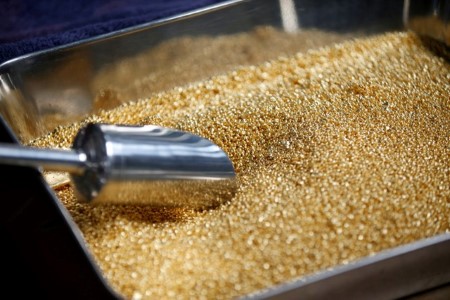




Philippines Trade Update: Imports weaken on tepid demand
 DOWNLOAD
DOWNLOAD

Policy Rate Updates: BSP outlook — cloudy with a chance of rate cut
 DOWNLOAD
DOWNLOAD

January Economic Update: Growth slows, prices rise
 DOWNLOAD
DOWNLOAD


Gold rebounds on dollar retreat as Fed still seen cutting rates

March 13 – Gold prices rose on Wednesday, buoyed by a weaker dollar, as investors held on to hopes of a June rate cut by the Federal Reserve despite a hot US inflation print, while escalating geopolitical tensions kept bullion’s safe-haven demand intact.
Spot gold gained 0.8% to USD 2,174.96 per ounce, as of 3:10 p.m. EDT (1910 GMT).
US gold futures settled 0.7% higher at USD 2,180.8.
The dollar index was down 0.2%, making gold cheaper for overseas buyers.
“The situation for gold bulls right now is a win-win, if Fed cuts rates, gold jumps substantially, if they don’t cut rates, there will be concerns on inflation that could push gold higher,” Bob Haberkorn, senior market strategist at RJO Futures, said, adding that gold’s upside today shows buying on dips.
Bullion on Tuesday retreated from its record highs scaled last week, posting the worst single-day drop since Feb. 13, after a report showed US consumer prices rose sharply in February, indicating some stickiness in inflation.
Higher-than-expected inflation translates into more pressure on the Fed to keep interest rates elevated, weighing on non-yielding assets such as gold. The precious metal is also used as a hedge against inflation.
But traders continue to bet on interest rate cuts in June, pricing in about 65% chance compared to 72% before the CPI data, according to the CME Group’s FedWatch Tool.
“The Russia-Ukraine war and the (Israel-Hamas) conflict are baked into the price and have been for some time,” said Will Rhind, CEO of GraniteShares.
Gold would be further supported by “an escalation or new development, something material to put in focus the geopolitical risk aspect,” he said.
Focus is now on US retail sales, the producer price index and the weekly initial jobless claims, all of which are due on Thursday.
Spot platinum rose 1.5% to USD 938.02 per ounce, palladium gained 1.6% to USD 1,057.88 and silver was up over 3% at USD 25.00.
(Reporting by Anjana Anil in Bengaluru; Editing by Shilpi Majumdar, Shailesh Kuber and Krishna Chandra Eluri)
This article originally appeared on reuters.com





 By Reuters
By Reuters